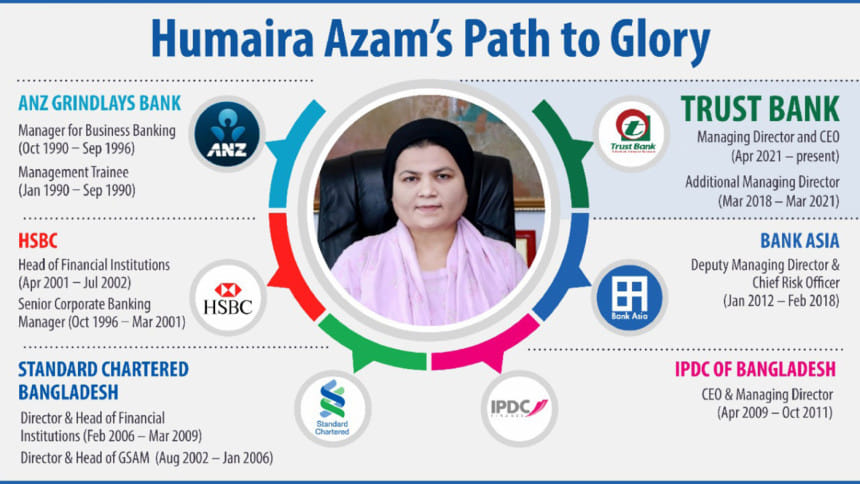There is no glass ceiling for women, sky is the limit

Women should strengthen their psychological state and be always prepared to face any challenge to find success in the banking sector.
There is enormous scope for women to work in corporate banking, SME banking, treasury banking, but for all that, ensuring an enabling environment for them is a must.
Humaira Azam, CEO and managing director of Trust Bank, made the comments during an interview with The Daily Star.
She took charge of the bank this month and set a milestone by being the first female CEO and managing director of any commercial bank in the 50 years' history of Bangladesh.
The veteran banker has seen every up and down of the country's banking sector. From her experience, she believes it is the duty of the predecessors to create opportunities for women so that they can flourish as a banker.
"Above all, support from the family is also required for women to achieve success in banking. Otherwise, it would be very tough."
Maintaining a balance between work and life is vital to find success in life for a woman, she said.
"Women have to work at home and outside of home simultaneously. Even, I had to walk all the way to my office in Hadi Mansion from Gulshan several times during countrywide strikes to ensure smooth banking services for the clients."
Longer office hours have been part and parcel of the banker since the beginning of her career.
"I have always tried to focus on my work. I made all the way to reach this position through hard work."
Becoming the CEO and managing director was not a new thing for the mother of one. She has earlier served IPDC of Bangladesh—which is currently known as IPDC Finance Ltd—as CEO and managing director from April 2009 to October 2011.

"Competency can never be the parameter to look forward to while appointing a CEO. The organisations, which believe in transparency and follow corporate guidelines, give the highest importance on finding out the most suitable and skilled one for the top post."
The efficiency of a leader can be measured on how well he/she can develop a skilled workforce, she said.
The empowerment of employees is very important for the leaders to ensure continuous growth of any organisation, she said.
The leaders should also encourage the employees to work as a team, she added.
Humaira started her career with ANZ Grindlays Bank in 1990 as a management trainee.
She said ANZ had given the strong base for her career.
"This bank has helped me believe that I can do it. It has developed the all-roundedness in me."
She expressed her heartfelt gratitude to Muhammad A (Rumee) Ali. "A decision taken by banking stalwart Muhammad A (Rumee) Ali has played a major role at the beginning of my run in the corporate sector."
"My husband has encouraged me to enter into the banking sector, but the ladder that I needed to find success in banking was extended to me by Muhammad A (Rumee) Ali."
Humaira joined HSBC during its inception and laid a very strong framework for corporate, offshore banking, custodian and institutional banking.
"I worked hard in HSBC for its authorised dealer licence, offshore banking licence and set up the bank's work plan for the next decade."
Humaira left HSBC as its head of financial institutions in 2002 and took up the post of a director and group head of special asset management in the same year in Standard Chartered Bangladesh.
"I helped Standard Chartered in their four most critical years to cover for the shortfall in the country budget through a successful recovery."
"I have been the bank's first female banded staff and the first female member of the management committee."
As a member of the country management committee, Humaira played a strong role in StanChart in developing the country strategy, restructured and broadened role in financial institutions, covering investors and intermediaries and donor organisations.
After joining IPDC of Bangladesh in April 2009 as managing director and CEO, Humaira made significant progress in business and operational growth both in terms of quantity and quality and restored the capital of the institution.
Humaira worked to upgrade different systems and develop various teams in Bank Asia when she joined the bank in 2012 as deputy managing director and chief risk management officer.
"Around 42 per cent of the bank's profit came from the branches, which were mentored by me."
The first female member of the Shariah council of Bangladesh, Humaira said the number of women entrepreneurs is increasing day the day, and an increased number of them are getting banking services now.
Banks are now not only extending loans but also working for developing women entrepreneurs, she said.
"Women should come to the banks, and they should reach us. We will definitely help them and hold their hands."
The ongoing Covid-19 epidemic has taken a heavy toll on the Bangladesh economy, she said.
"The pandemic compelled many factories to close their operations. It was not possible to measure the financial loss of the economy. However, the downward movement of the GDP actually reflects the loss."
The government has found some success with the disbursement of stimulus and helping the poor who were affected by the epidemic, she said.
All businesses should ethically come forward for the sake of the country, she said
Many big industries faced losses, and many orders have been cancelled for the Covid-19 outbreak at a time when the world was suffering from a global economic meltdown, she said.
"For Bangladesh, the SME sector should be kept alive. Steps should be taken for them to recover the Covid losses. If an SME falls for once, it becomes very tough for it to stand again because of their poor capital base."
Banks should extend special help to the SME sector, and the government should also come forward with special incentives for them, she said.
Humaira has worked for both foreign and local financial institutions in her career.
She thinks local banks should upgrade their work culture and work for winning people's acceptance to be as successful as the foreign ones.
Foreign banks are systemically and digitally very advanced, and the local ones lag far behind the foreign banks in the field of information and technology, she said.
A transparent operational structure works as a motivation for the employees in the foreign banks, Humaira said.
"They have quality people who have been upgraded intellectually through training. They are also awarded and recognised for their advancement."
Because of the global standing and acceptance of the foreign banks, they can accept deposits at a very low cost, which is difficult for local banks.
At the end of the interview, Humaira expressed her gratitude to the chairman, vice chairman and the board of directors of Trust Bank for believing in her and appointing her as the bank's CEO and managing director.
"My husband, Ershadul Haque Khandker, has been my friend, my mentor who was the main reason for me to be in the banking sector."
"Definitely, my mother, family members and mentors were there to guide me, but my husband played the biggest role."
Humaira lost her father, Syed Ali Azam, a late professor of Dhaka University, after her secondary school certificate exam. "After that, our mother Shahana Begum had singlehandedly raised our five siblings."
"I love working a lot. I do everything, starting from gardening to cleaning all the corners of the house to cooking," the cheerful banker said.

 For all latest news, follow The Daily Star's Google News channel.
For all latest news, follow The Daily Star's Google News channel. 



Comments